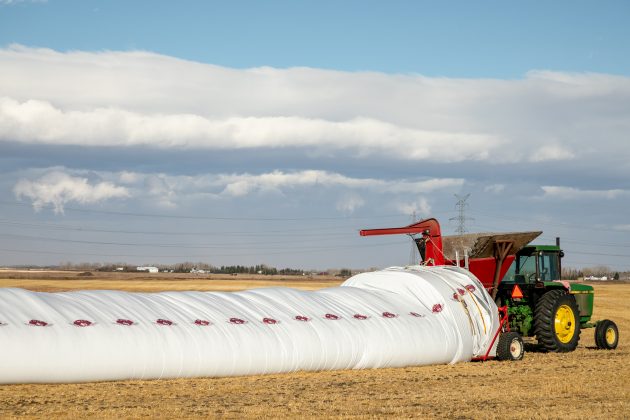
Cleanfarms pilot launches in Peace River Regional District
by CM Staff

Cleanfarms’ contractors will pick up the material from the collection sites and transport it to recycling facilities in Canada and the USA where it will be processed for reuse in new products such as car parts and plastic bags.

Farmers use plastic grain bags to store harvested grains until ready to be taken to market. A new pilot in the Peace River Regional District enables farmers to recycle the used grain bags and twine when they are finished with them. (Photo: Cleanfarms)
MOOSE JAW — With the prevalence of canola, grain and forage seed crops as well as beef cattle farming in the Peace River Regional District (PRRD), plastic grain bags and baler twine are important agricultural tools for farmers/producers in the region.
Important as grain bags and baler twine are in many farm operations, managing the used materials when farmers are finished with them can be a challenge. Until now, the used material has been either landfilled or stored on farms.
Beginning this week, Cleanfarms, with the support of the PRRD, is launching a pilot to enable local farmers to recycle the baler twine and grain bags at no charge by taking them to one of eight collection sites located throughout the district.
Cleanfarms’ contractors will pick up the material from the collection sites and transport it to recycling facilities in Canada and the USA where it will be processed for reuse in new products such as car parts and plastic bags.
“We estimate farmers in the PRRD generate about 70 tonnes of used agricultural baler twine and grain bags annually,” said Cleanfarms Executive Director Barry Friesen. “By taking the used ag plastic to collection sites to be recycled, local farmers can keep their farm properties clean and tidy, and contribute to sustainable use of natural resources. It is a solution that meets the challenge of managing the used materials today and contributes to a cleaner environment for tomorrow’s farm families.”
“Every tonne of grain bag plastic and kilometer of baler twine requires natural resources and energy to a manufacturer. By recycling these materials, we ensure that we use their full value which fuels a circular economy for agricultural products in Canada. That’s something we can all get behind,” Friesen added.
Cleanfarms plans to expand pilots like this, which target used agricultural plastic across the country to achieve a goal of zero plastic waste to landfill in agriculture.
The collection sites are located at the Cecil Lake, Prespatou, Tomslake, Rolla and Buick Creek Transfer Stations, and at the Bessborough, Chetwynd and North Peace Regional Landfill sites.
To recycle the ag twine, farmers must place it loose and free of debris in large Cleanfarms collection bags that are available free of charge at any of the collection sites. Grain bags must be machine rolled and securely tied. Both can be dropped off at the designated collection sites free of charge.
Learn more at this Cleanfarms program page.